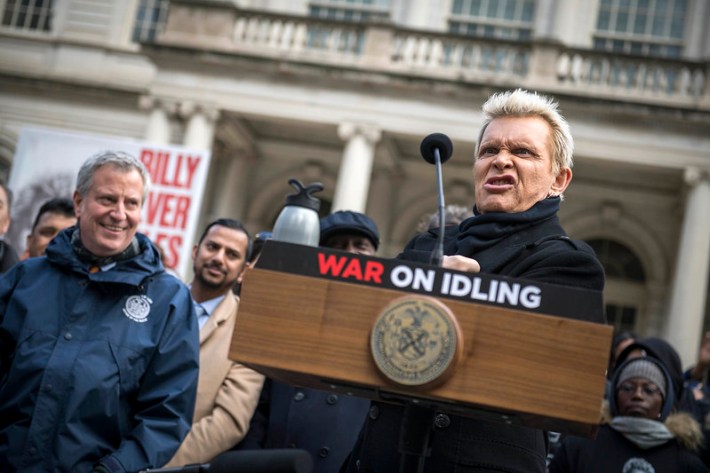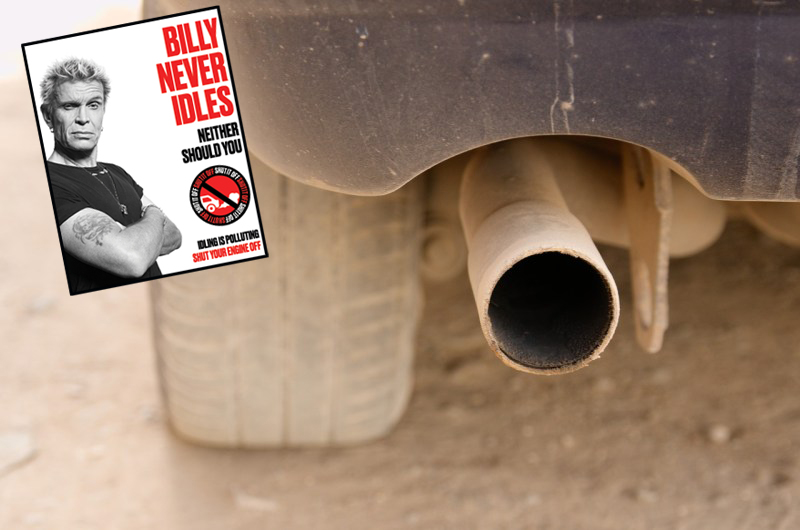What part of environmental protection do they not get?
The city agency in charge of cleaning the air and water is considering a tiny, but crucial, rule change that will lead to fewer idling summonses and will worsen air pollution, advocates said at an online hearing on Wednesday. But there's a chance they may yet persuade the Department of Environmental Protection to back down.
Under existing law — § 24-163 of the city administrative code — a driver can be ticketed for idling his or her car for three minutes (or one minute near a school) "unless the engine is used to operate a loading, unloading or processing device, and idling of an engine." (Emphasis added.)
In plain English, the current definition of "processing device" is any device that is "necessary to accomplish the vehicle’s designed purpose (e.g., a cement mixer), or a temperature control system for food or other temperature-sensitive items," the agency said in its public meeting announcement.
The agency is considering changing that language to "a device necessary to accomplish the work for which the vehicle or equipment was designed ... including operating a lift, crane, pump, drill, hoist, mixer or other auxiliary equipment other than a heater or air conditioner; or a system designed to control the environment of temperature-sensitive cargo or substances, including but not limited to food."
The emphasized sections above drew the most ire from opponents at the hearing and in the written comments (no supporters testified). Manhattan Community Board 4, whose neighborhoods of Chelsea and Hells Kitchen have some of the worst air in the city, has been leading the charge against the rule change, voting 41-0 in February to reject it.
"These exemptions, which the City Council wisely decided not to include in its own definition of 'processing device,' would create an argument that just about any activity that requires power in a vehicle is an idling defense," the board wrote in a letter to the DEP. "Essentially charging a phone or a computer, keeping headlights on, would become an excuse for idling because it could be argued the vehicle 'was designed' to charge a phone or turn on headlights. Similarly, running the air conditioning while the operator enjoys (or even claims to be keeping in the back seat for enjoying later) a single ice cream cone or sushi (each, a temperature-sensitive food substance) would seem to fall within part two of the DEP’s proposed exemption. The DEP’s proposed broad and vague language is unacceptable. It would eviscerate the idling law that the City Council created."
The board — which last year demanded that the city raise the shockingly low fee for idling — also pointed out the big "P" in the agency's name, as well as last year's successful ballot referendum that enshrined in the state constitution that "each person shall have a right to clean air and water, and a healthful environment."
"The DEP, of all agencies, should respect, and not seek to limit or overturn, the efforts of City Council to protect our lungs and our planet ... and [be] guided by the newly and overwhelmingly enacted 'right to clean air' in the New York Constitution’s Bill of Rights," CB4 wrote.

Regular New Yorkers who testified included a small cohort that has the Sisyphean task of reporting idling vehicles to the DEP (in exchange for a small portion of the summons fee). Several noted that the Adams administration signed off on the proposed rule change because it "minimizes compliance costs" for the regulated companies, which is another way of saying that the city doesn't want to create a new burden for multi-billion-dollar corporations.
"It is beyond time for the Department of Environmental Protection to live up to its name and to be an ambassador for New Yorkers, not for companies trying to maximize their short-term profits by harming New Yorkers’ health and wellbeing," said Dr. Patrick Schnell, a pediatrician and fellow of the American Academy of Pediatrics.
Another citizen idling reporter argued that redefining "processing device" would "defang" the idling law.
"This definition is essentially allowing any vehicle in New York City to idle indiscriminately and creat[e] mobile offices," said Logan Welde. "City Council has already rejected this as a definition and if DEP does adopt this it would be illegal. ... The intent of the idling law was to stop idling in New York City and protect the health of its residents and the environment. If this rule is adopted, it will further diminish the air quality in New York City, harm the health of residents and worsen our environment."
He also pointed out that the worst offenders happen to be some of the biggest companies in town — ConEd, Verizon, Spectrum, FedEx, Amazon, Go New York Tours, Fuji bus and Greyhound.
"The companies that you are allowing to pollute our air are making millions, and in some cases, billions of dollars by polluting our air," he said. "They should be responsible for adopting new technology to continually improve the air quality by reducing the reliance on idling over time."
State Sen. Brad Hoylman (D-Manhattan) testified via written statement.
"Drivers most often idle in front of highly trafficked pedestrian areas, such as stores, businesses, playgrounds, and hospitals among others," he said. "Studies have demonstrated the gravity of this issue; those that live near large roadways face serious health repercussions like elevated risks of asthma attacks, heart disease, stunted childhood lung development, adverse birth outcomes, lower IQ scores, cancers and other diseases contributing to premature death."
A second DEP hearing followed the first one about the rule change, specifically discussing a request by Spectrum, the cable company that had $48 billion in revenues last year, for a variance from the existing rules. All of the people who testified were against granting a waiver to the company.
One opponent of the variance, Brian Gatens, started by quoting new DEP Commissioner Rohit Aggarwala to his own workers. Back in January, the top environmental watchdog said, "We're now in the critical decade of the climate fight ... and so our challenge is to operationalize these three things — resilience, decarbonization and environmental justice — and to drive them into the daily operating decisions made across a wide variety of city agencies."
Gatens pointed out that "these seemingly small steps that chip away at the idling law and the air code" amount to the exact opposite of "operationalizes" the mayor's agenda. He argued that it would be simple for a wealthy company like Spectrum to simply provide its workers with spare batteries to run their laptops or cool their sushi.
"The answer is not to run to DEP for a variance — and it's embarrassing of Spectrum to do so," he said. "The answer is to adopt better technology. That's what every other responsible company does. Spectrum could have done that at any point since 1972, which is when the vehicle idling law went into place. And they've given no reason why they have not come into compliance in that 50-year period. Spectrum has not demonstrated unreasonable hardship, and for that additional reason and that primary reason this has to be denied."
In its request for a variance, Spectrum opened with an assertion about its parent company, "Charter is committed to protecting the environment in the cities that we serve."
The statement went on to contradict that, saying that since late 2019, "Charter Communications has received over 200 idling complaint citations totaling tens of thousands of dollars which originated from the Citizens Air Complaint Program." [According to the DEP, Charter has received 327 such tickets since 2019.]
But the idling is completely necessary, the company argued.
"Our technicians cannot perform their critical work duties without the equipment mentioned, and that equipment cannot function without being continually charged," the company said.
For its part, Department of Environmental Protection spokesman Edward Timbers told Streetsblog that the agency is tweaking the language because the term "processing device" "is not defined in the code which has caused unnecessary confusion and even some [administrative law judge] decisions that dismissed otherwise valid idling summonses."
Streetsblog asked Timbers to assuage advocates who are worried that the change in language will result in far fewer idling reports being confirmed with a summons. He said the agency does not agree.
"An appropriate definition of the term will provide clarity for the complainants, the vehicle operators and the hearing officers," he said. [Advocates wholeheartedly disagree that the term is not properly defined.]
But then Timbers suggested that advocates may have been persuasive.
"Due to some persuasive comments received during the public hearing, we are considering some tweaks to the proposed new language," he said.
Whatever happens, the back-to-back hearings are serious business for anyone who cares about air quality, yet very few New Yorkers were even aware of them. And a shockingly low number of New Yorkers take advantage of the program that allows them to report idling trucks and get 25 percent of the ticket fee. As Streetsblog reported last year, 85 percent of all idling submission are filed by just 20 people — and four people submitted roughly 50 percent of all idling complaints.
And it is clear that idling is simply the cost of doing business for some corporations. Even at the slightly higher rates proposed by CB4, Con Edison (a $12-billion company) would have to pay about $500,000 more in idling fines per year. Verizon, a $33-billion company, would pay about $375,000 more per year.
DEP and the public are not the only ones responsible for fining vehicle owners for idling. The Department of Transportation also has a $100 idling ticket on its books. But the NYPD’s traffic enforcement team writes very few tickets — fewer than 50 in the second half of 2021, according to the agency.






